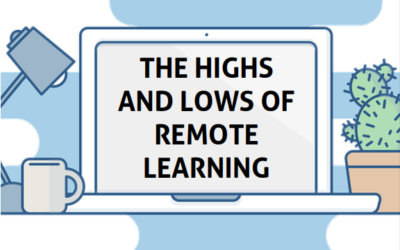"I don’t know how I’ll get through this. I know I must, but I am beyond exhausted." - a parent, APM Reports "What did we do to deserve this torture?" - a student about I-Ready By now, many school children and university students around the world have had some...
Education During the Pandemic: Preparing for the Unpreparable [Premium]
As I am writing this, omicron cases have not reached their peak in the US, and calls for schools to close again because of the extreme contagiousness of this variant. How do parents, teachers, and tutors prepare for another unpredictable year? ONE STUDENT AT A TIME If pandemic education has told us anything thus far, it’s that students will tell us what they need as much as any best laid plans. No matter what you decided for your students for the past year, reviewing what worked and what didn’t can be valuable going forward. If you have several children, you might have seen something work for one student, but not another. As before, the goals should be focusing on reasonable fits and not inflexible […]
Strength-based Thinking and Communication through Metaphor [Premium]
“Since dyslexics are visual learners and thinkers, I make sure to integrate that into how I work throughout the day. I always approach architecture decisions via white-boarding. I use metaphors when I explain things to other people or when I try to reason about the problem space in my head…” – Josh Brunner, from Embracing Dyslexia as a Software Engineer An interesting thing happened when researchers (sorry free abstract only) set out to study figurative language in dyslexic and non-dyslexic people. Dyslexia is often referred to as a “language learning disability” and in the usually deficit-focused literature, there have been plenty of studies that might have suggested figurative language could be problematic – but Kasirer and Mashal also were aware of the creativity literature […]
Higher Math for Scientists: Don’t Give Up [Premium]
“…To be a successful scientist, you need to do what you like to do. If you don’t like mathematics, don’t give up. That doesn’t forestall you’re being a scientist at all.” — E.O. Wilson One of the first science professors I had as a freshman at Harvard was E.O. Wilson, a pioneer of Evolutionary Biology, and scientific giant. I would only learn years later that he was also dyslexic, struggled with math, and was blind in one eye due to a childhood injury. He passed away in December at the age of 92, and left a legacy of insights on the natural sciences and the education of young scientists. One bit of advice that drew him into controversy was his strong insistence that “being […]
Literature for Dyslexics [Premium]
“What can students learn from literature they cannot learn elsewhere? Why should they bother?” — Gary Morson At the same time that Brock and I have been reviewing the research literature for our update for Dyslexic Advantage, I also came across an article by Russian Literature professor Gary Morson on Why College Kids are Avoiding the Study of Literature. As it turns out, some of the problems and solutions he identifies has direct implications for dyslexic readers. THE CHALLENGES The challenges facing dyslexic readers and complex literature are many – there is so much of it, for instance, the sheer quantity may be impossible for younger readers even if they are able to listen-read through audiobooks; great literature may also have complex grammar […]
In Memoriam: Legendary Architect Lord Richard Rogers
Lord Rogers revolutionized architecture as well as the way people thought about city planning. At the peak of his success, he reconfigured his architecture firm as a charity. Rogers recently passed away at 88, but his legacy will live on. ...
Questions and Answers
From our recent virtual lecture for the Hamlin Robinson Speaker Series, here are a few questions from viewers: QUESTION: How do you separate vision processing disorders from dyslexia? How do you think about these? Also same with auditory processing disorders like...
Finding the Positive
Recently, I received an email from parents of a student that we tested almost ten years ago. They were celebrating their recent news of his acceptance into his college "dream" pick. Things had looked very different a decade ago, but since that time, I know he had...
MATH: Learning Through Examples, Not Repetition and Drill [Premium]
“… children with dyslexia, because of disruption to left hemisphere language area, use a less optimal route for retrieval-base arithmetic, engaging right hemisphere parietal regions typically used by good readers for procedural-based arithmetic.” — Evans et al, 2014 TEACH MATH TO DYSLEXIC STUDENTS THROUGH STRENGTHS It was a research group at Georgetown University that first made the observations that a group of school age dyslexic students used a different brain strategy when doing single digit arithmetic. As it turns out, an area of the brain (left angular gyrus) implicated in some of reading difficulties associated with dyslexia is also the area of the brain that processes math learning through drill in non-dyslexic kids. So math drill may be the exactly wrong way to teach […]
Connecting the Dots with John Chambers of CISCO [Premium]
“A lot of leaders would say they’re curious. I can tell you from personal experience that most leaders are not. They don’t ask a lot of questions, rarely challenge conventional wisdom, stick with what they know, and often turn to sources that reinforce their existing point of view… my curiosity about things I don’t understand has been a critical factor in my success as a leader.” – John Chambers I recently came across a book review of Chambers’ book by Emma Wallace, a fellow dyslexic who works in a very different industry, fashion. Despite these differences, Chambers’ description of strengths resonated. “Not only has dyslexia meant that for John (and myself) it forced him to learn important skills early on: persistence, finding your […]
Multiple Choice Questions and Dyslexia [Premium]
One bane of higher education and professionals is the ubiquity of multiple choice questions and tests acting as gatekeepers for higher levels of credentialing, program admission, or pay. This problem affects individuals seeking their GED, drivers licenses, college entrance exams, graduate school exams, professional licensing and credentialing exams, and formal performance reviews in company settings. Individuals with stellar educational and work achievements, may find their advance in schooling or job positions blocked because of trouble on multiple choice tests which may hold inappropriate sway on assessments and evaluation. Why? WHY MULTIPLE CHOICE TESTING IS A COMMON CHOICE FOR ASSESSMENT One of the reasons that multiple choice questions are so pervasive is that once written, a database of questions can be used to automate […]
The Social-Emotional Side of Dyslexia [Premium]
“A lot of the time I take the parts of learning that are still hard for me as rejection — as someone telling me I can’t. I see points taken off for misspelled words on in-class English essays, and I start to see my future crumbling. I see the colleges that my dyslexia could prohibit me from going to. I see the kids with better scores, who don’t need tutors, or extra time, and I feel jealous. I feel worthless.” – Anna Kopelmann The social emotional journey for dyslexic people can be complex and change over time depending on one’s life contexts, support, and environment. As few as 1 in 4 dyslexic students may be formally identified in public school systems, leaving the majority […]


![Education During the Pandemic: Preparing for the Unpreparable [Premium]](https://www.dyslexicadvantage.org/wp-content/uploads/2022/02/Education-during-the-Pandemic.png)
![Strength-based Thinking and Communication through Metaphor [Premium]](https://www.dyslexicadvantage.org/wp-content/uploads/2022/02/Strength-based-Thinking-and-Communication-through-Metaphor-e1644394632260-400x250.jpg)
![Higher Math for Scientists: Don’t Give Up [Premium]](https://www.dyslexicadvantage.org/wp-content/uploads/2022/02/Higher-Math-for-Scientists-2-400x250.jpg)
![Literature for Dyslexics [Premium]](https://www.dyslexicadvantage.org/wp-content/uploads/2022/02/Literature-for-Dylexics-400x250.jpg)



![MATH: Learning Through Examples, Not Repetition and Drill [Premium]](https://www.dyslexicadvantage.org/wp-content/uploads/2022/01/Learning-through-Examples-4-400x250.png)
![Connecting the Dots with John Chambers of CISCO [Premium]](https://www.dyslexicadvantage.org/wp-content/uploads/2022/01/Connecting-the-dots-400x250.jpg)
![Multiple Choice Questions and Dyslexia [Premium]](https://www.dyslexicadvantage.org/wp-content/uploads/2022/01/Choices-e1641384810543-400x250.jpg)
![The Social-Emotional Side of Dyslexia [Premium]](https://www.dyslexicadvantage.org/wp-content/uploads/2022/01/The-Social-Emotional-Side-of-Dyslexia-400x250.jpg)













